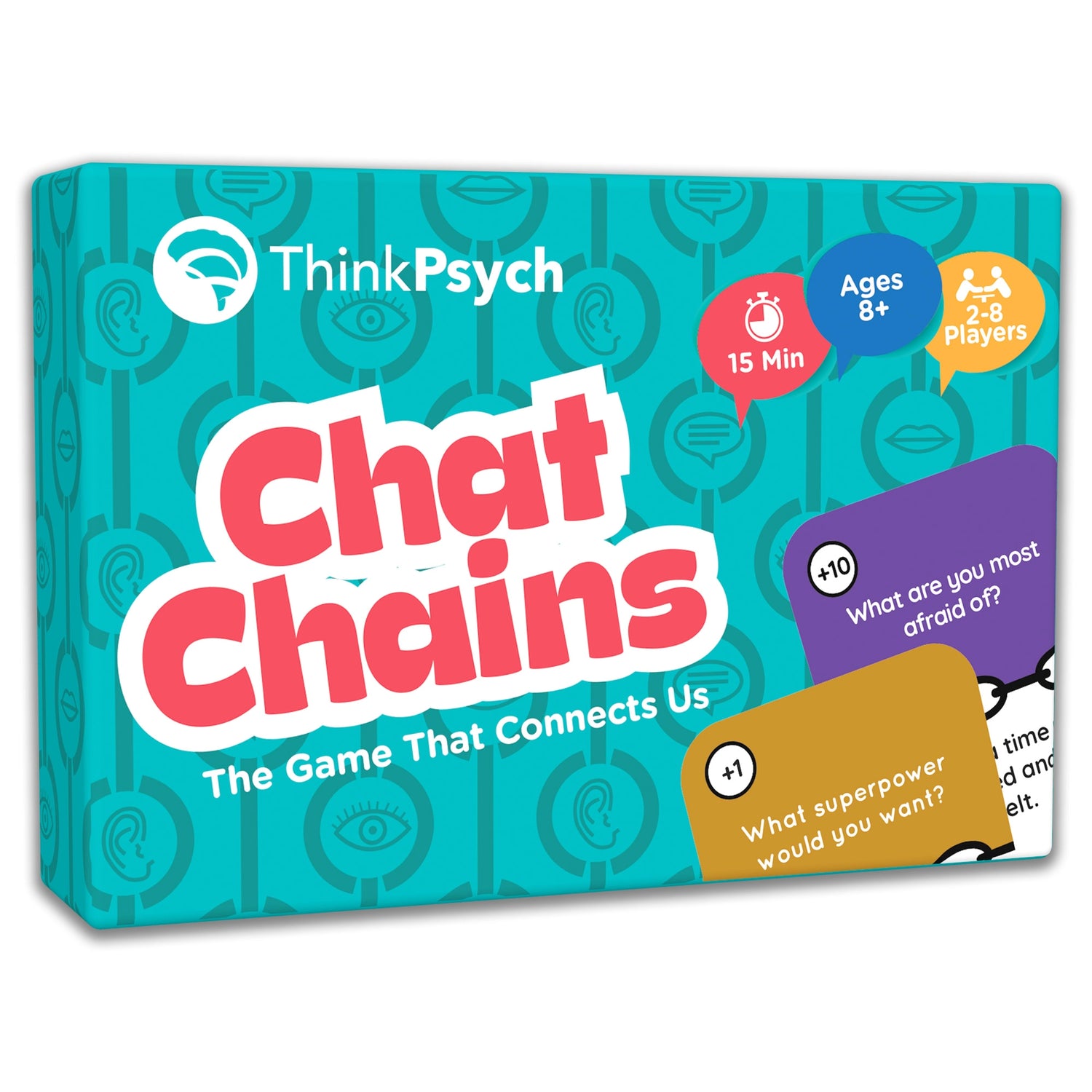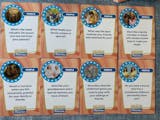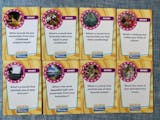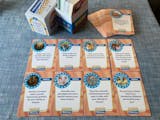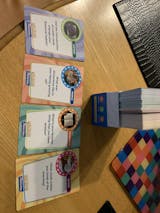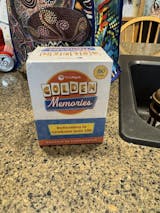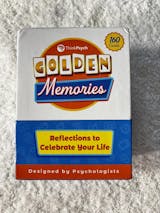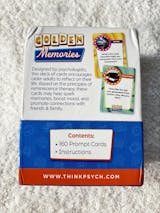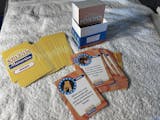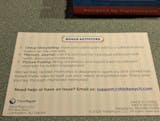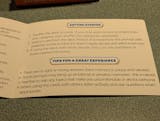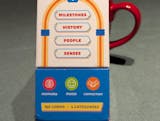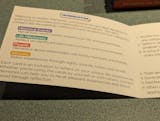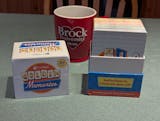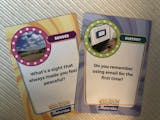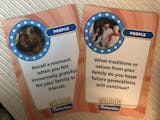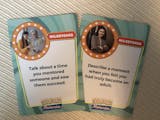ThinkPsych
Golden Memories
Golden Memories
Couldn't load pickup availability
- PSYCHOLOGIST-DESIGNED – Based on reminiscence therapy to boost mood and cognitive function.
- 160 THOUGHTFUL PROMPTS – Cards spark joyful memories and meaningful conversations for seniors.
- VERSATILE USE – Great for families, caregivers, or groups in any senior or memory care setting.
- PERFECT GIFT – A heartfelt gift for retirees or birthdays that builds bonds and preserves stories.
- PROFESSIONAL QUALITY – Large-print, sturdy cards with expert-approved text in a durable box.
Share







This is a set of well thought out cards that can be used in so many different ways. Of the 4 categories (History, Milestones, People and Senses), the cards in the categories "People" and "Senses" are my favorite and they can be used to connect and bond with friends, family members and relatives of many age groups. I found it fun just going through them myself! The cards in the "History" category contain questions about the 60s so those would only be suitable for people 60+, but you can always skip a card if it isn't relevant. Overall, I think these are excellent.
This is such a simple but great concept for folks that want to engage and have deeper conversations with their loved ones whose memories might be starting to fade a bit. My father was diagnosed with early dementia symptoms and his memory has taken a very noticeable decline in the last few years. I see him weekly and our conversations usually go to the same stories that he likes to tell myself and my kids. These cue cards are an excellent way to get more great stories out of him while helping him exercise his memory muscles. Simple one sentence questions that can lead to some deep conversations and are actually fun to think through about in your own life, whether you have memory issues or not. A lot of the questions helped us get new stories/memories out of him that I’d never heard before! With 160 cards, we are sure to not run out any time soon. The box and cards themselves come in a nice overall package as well.
I found some of the questions/cues were a little hit or miss. There’s an entire category of cards dedicated to senses, with questions like ‘what was the smell of your first car like?’, ‘what did your school cafeteria smell like?’; which are kind of interesting but we found never really went anywhere in our discussions. Even myself, with no memory issues, had a hard time starting a conversation with those cues. There’s even some pretty oddly specific ones like ‘how did the gas shortage of the 1970s impact your life?’.
That being said, you can tell that this set was developed by professionals (as advertised) so perhaps the different cues that didn’t work well for my family would work better for others. Definitely recommend this product to anyone with a parent/loved one experiencing memory loss!
Great for discussion social groups, especially senior groups. The prompts are warm and nostalgic, and they really got everyone talking, even the quieter folks opened up and shared stories. It sparked laughter, some sweet memories, and a few emotional moments too. The cards are easy to read, and we just took turns picking one and going around the circle. It’s such a great way to build connection and keep the conversation flowing without feeling too forced.
This THINKPSYCH Golden Memories is not a game but more of a conversation starter. It can be played like a game but there's really no rules. It would be helpful for volunteers/family members to engage someone with Alzheimer's etc. Some questions are more suitable than others for each person, so just draw another card. I was pleased that the cards were much larger than anticipated, much bigger than playing cards. It makes the card question easier to read. If the person has lost the ability to read, just read it for them. The 160 cards store in a strong cardboard stand up box. A nice addition to any senior's care home etc.
Currently reasonably priced at $25.99.
I have been interested in genealogy and family history since I was a teenager and a big part of that is learning to ask the right questions in the right way to get the answers to whatever you are hoping to find out more about.
There are the standard core questions that involve the basics - names, dates and places - that most know to ask automatically. But the questions that really define a life are the events and emotions that make a person who they are, and it is what most family historians and social historians are really after. Those are the questions I am constantly on the lookout for, or new and better ways to phrase old ones to elicit a response.
This set of questions about ones life and memories intrigued me, as they are advertised as being written by mental health professionals, which I am not, and who had taken into account the needs of people who had some form of dementia at the same time. I wondered what they might ask and how different those questions would be or the phrasing of them.
This set of questions - and there are 160 questions in total - have been grouped into four broad categories - milestones, history, people and senses, and the questions were written to evoke memories to both boost mood and help create connections with others. While I found the milestone questions similar to what I might have thought of on my own to ask, I was surprised with the history questions having been more up to date that what is often seen or suggested to ask. Instead of asking about how World War 2 impacted your life and your memories from that time, they instead are asking about your memories of when email first started, reminding me that I should be writing down my memories as well, as I am no longer considered part of the middle generation who has parents still living, but am now considered part of the elder generation that is supposed to know the answers to those sort of questions.
I found the questions being asked about people interesting and different, as the question might start by asking about something someone else did, and end by asking how you felt about what that person did. As well, the sensory category of questions included ways of trying to help someone recall past memories by asking questions about taste, touch, smell sight and sound rather than asking a question about a specific memory, and then see where that sense actually takes them going back in time.
I actually found this set of questions about recalling family history or memories of a life very interesting indeed, and while it gave me less ideas of new questions that should be asked, it definitely opened my eyes as to different ways to help someone with memory issues try and recall things from their past and possibly help them to both connect and communicate those memories with better clarity to others.
